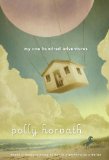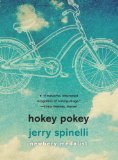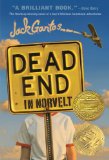Summary | Excerpt | Reviews | Beyond the book | Read-Alikes | Genres & Themes | Author Bio

Critics' Opinion:
Readers' Opinion:
First Published:
Sep 2008, 272 pages
Paperback:
Jan 2010, 272 pages
 Book Reviewed by:
Book Reviewed by:
Jo Perry
Buy This Book
Lovely, fresh, ambitious, subversive, sharp and generous, My
One Hundred Adventures is a splendid novel for wise children; world-weary
teens; and adults, young and old. Reading Horvath is good for the mind, the body
and the heart.
Intrepid Polly Horvath again elevates children's book-writing to high art as she
has with The Trolls, and
The Canning Season. The very first paragraph takes off so swiftly and is
so good, I reread it twice, then felt the need to share it with someone:
"All summers take me back to the sea. There in the long eelgrass, like birds' eggs waiting to be hatched, my brothers and sister and I sit, grasses higher than our heads, arms and legs like thicker versions of the grass waving in the wind, looking up at the blue washed sky. My mother is gathering food for dinner: clams and mussels and the sharply salty greens that grow by the shore. It is warm enough to lie here in the little silty puddles like bathwater left in the tub after the plug has been pulled. It is the beginning of July and we have two months to live out the long, nurturing days, watching the geese and the saltwater swans and the tides as they are today, slipping out, out, out as the moon pulls the other three seasons far away wherever it takes things. Out past the planets, far away from Uranus and the edge of our solar system, into the brilliantly lit dark where the things we don't know about yet reside. Out past my childhood, out past the ghosts, out past the breakwater of the stars. Like the silvery lace curtains of my bedroom being drawn from my window, letting in light, so the moon gently pulls back the layers of the year, leaving the best part open and free. So summer comes to me."
The voice belongs to Jane Fielding, daughter of single-mother Pulitzer
prize-winning poet Felicity Fielding, inhabitant of a porous Massachusetts beach
house, best friend to town-dweller Ginny, who wants to be a fashion designer
when she grows up. Other notable characters include whales, real and imaginary;
the sea; a bone; a man "who looks like a clothes hanger"; elderly Mrs. Parks who
suffers a thrombosis; Mrs. Nasters, stricken with cancer; a faith healer, two
con-women, and a lethal bag of horehound candy.
By now you might be wondering if the story of Jane Fielding's twelfth summer is
really a story for 9 year olds. To read it one must find out what a thrombosis
and horehound candy are, must think about prayer, and contemplate paternity, the
suddenness of death, and poetry. But slipping into this book is effortless, like
letting oneself float down to the bottom of a swimming pool on a hot day. Like
E.B. White before her, Horvath doesn't patronize young readers. She assumes the
world is completely theirs as much as it is ours, and that they are capable of
subtlety:
"But despite all this churchgoing every Sunday of every year, it isn't until
this year, when I am twelve, that I have figured out I can pray. Perhaps I have
had nothing to pray for until now. As if itchy and outgrown, my soul is twisting
about my body, wanting something more to do this summer than the usual wading in
the shallows and reading and building castles on the shore.
. . . I pray for a hundred adventures. And maybe, I think, if I pray all the
time unceasingly as Nellie is telling us we should, as I walk to town and help
my mother shuck oysters, as I make baskets from reeds and sweep the floors or
weed the vegetable garden, as I sit mooning over the movement of the wind and
lying on my back, lost in the thoughtlessness of doing nothing, then there might
be a response. And so I do and maybe it is because of this that it all happens.
. . . Who would think that the universe would pay any attention to me?"
Jane's prayers for adventures are answered with a picaresque (or perhaps
Fieldingesque) series of escapades: Jane finds herself in a hot air balloon
loaded with Bibles adrift in the afternoon sky; Jane discovers a benevolent
trailer park resident who resembles Santa Claus, reads Robert Frost aloud and
shares fresh raspberries; Jane is extorted into babysitting a group of unruly
and unpleasant children; Ginny disappears; men arrive and depart the beach
house; Jane's mother gives a poetry reading at the local library; Jane witnesses
a drowning and two near-drownings at sea; there is a death and a funeral and a
search for a poodle (or a portal to another dimension).
Horvath ends the novel before Jane has achieved one hundred adventures and along
the way she has lost a father she never knew existed; Mrs. Gourd and the
children will occupy the beach house and the Fieldings will migrate north to
Canada for the fall and winter. There is no cliché or agreed-upon truth upon
which Horvath rests Jane's narrative. If there is an idea, it is one subversive
to grand finales: that Jane, like the rest of us, already owns her own place in
the universe:
"We belong here equally. . . Just by being born onto the earth we are accepted and the earth supports us. We don't have to be especially good. We don't have to accomplish anything. We don't even have to be healthy."
Jane is still Jane. She's observed that some accidents are lucky and some are
unlucky, that contrary things can be true, and that you can't always share or
explain what you think and feel:
Is this what it is to get older, to have adventures you can no longer tell
your family because you are moving apart from them? . . . Or do you grow up and
have adventures you tell no one? Are some adventures yours alone?"
Whether or not she can share them or must savor them alone, Jane decides that she "wants her life to be a series of adventures." The word 'adventure' comes from advenire (Latin), to arrive, and contains the fatalistic sense of "a thing about to happen." Implied within it is hazard, resignation, and forward-thinking. Understood this way, everything that happens is an adventure, and that is the way I think Horvath understands it, and why her writing is so exciting and so real. Most coming-of-age stories feature a first love born during a bittersweet summer, in which case My One Hundred Adventures could be classified as such. But in this extraordinary and golden summer tale, the young heroine falls in love with life itself.
![]() This review was originally published in The BookBrowse Review in September 2008, and has been updated for the
February 2010 edition.
Click here to go to this issue.
This review was originally published in The BookBrowse Review in September 2008, and has been updated for the
February 2010 edition.
Click here to go to this issue.

If you liked My One Hundred Adventures, try these:

by Jerry Spinelli
Published 2014
Master storyteller Jerry Spinelli has written a dizzingly inventive fable of growing up and letting go, of leaving childhood and its imagination play behind for the more dazzling adventures of adolescence, and of learning to accept not only the sunny part of day, but the unwelcome arrival of night, as well.

by Jack Gantos
Published 2013
A sly, sharp-edged narrative about a small western Pennsylvania town and a dead-funny depiction of growing up in a slightly off-kilter place where the past is present, the present is confusing, and the future is completely up in the air.





The House on Biscayne Bay
by Chanel Cleeton
As death stalks a gothic mansion in Miami, the lives of two women intertwine as the past and present collide.

The Flower Sisters
by Michelle Collins Anderson
From the new Fannie Flagg of the Ozarks, a richly-woven story of family, forgiveness, and reinvention.

The Funeral Cryer by Wenyan Lu
Debut novelist Wenyan Lu brings us this witty yet profound story about one woman's midlife reawakening in contemporary rural China.
Your guide toexceptional books
BookBrowse seeks out and recommends the best in contemporary fiction and nonfiction—books that not only engage and entertain but also deepen our understanding of ourselves and the world around us.